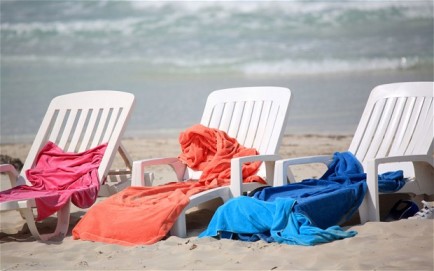
Being on holiday can be wonderfully liberating, but feeling free should not extend to feeling invincible.
One is as old as the package holiday itself, while the other is a relatively recent development that appears largely confined to a very narrow subset of British holidaymakers…
Welcome to the world of sand-hogging and balconing – two “crazes” that have, if not shaped, then certainly been a regular feature of Spain this summer, forcing authorities to crack down on both activities.
Sand-hogging is the natural extension of that very infuriating pastime of holidaymakers reserving a sun lounger around the hotel pool with a carefully placed towel or book, and then disappearing for hours on end, safe in the knowledge that their prime poolside spot should be waiting for them once they deign to return.
Balconing, however, is a rather more worrying craze whereby youths film themselves jumping from their balconies into a swimming pool below – the higher and drunker, it seems, the better. Now, however, Spanish authorities are beginning to get to grips with both sets of behaviours after a busy summer that has seen fines issued and people hospitalised.
In Valencia, local councils have been issuing fines of up to €720 to anyone caught reserving spots on the beach with towels, parasols or sun loungers early in the morning but not returning until later in the day.
As Spain’s popularity has soared in 2016, snaffling a favourable spot on the beach has become that much harder on the more crowded beaches that line the Mediterranean. Spain is simply following in the footsteps of Italy, which began issuing fines for similar behaviour earlier in the year.
In Gandia, near Valencia, the local town hall has even drafted in the help of the police to remove these seemingly abandoned objects from the beach in an effort to put an end to this practice. “I take a walk here every morning, and I see a lot of older people coming and basically setting up camp, all at the very front by the water,” Carlos Peiro, a fed-up local, told El País. “I don’t think it’s right.”
While the sand-hogging phenomenon would appear to be the, ahem, reserve of the older generation, balconing is a decidedly young person’s game. According to one surgeon who participated in a study looking into the impact of the craze, balconing has become something of a rite of passage for some tourists visiting Spain.
“It’s endemic,” said Xavier González of Son Espases hospital in Palma de Majorca. “It’s like an initiation rite for some tourists.”
The study examined those treated in hospital between 2010 and 2015 for injuries sustained while either falling or jumping from a balcony on the island. According to The Local, 60% of the 46 people treated for injuries were British, followed by Germans and Spaniards. The average age of those injured was 24, and all but one have been men. The average height of the fall is eight metres (26 feet).
However, the study omits the number of those who have died from their injuries, but does say that the craze has so far cost an estimated €1.5 million in hospital fees because many of those injured either end up permanently disabled or in intensive care for a long time.
In an effort to curb this craze, Spanish authorities are now issuing fines to those caught trying to make the leap, while leaflets on the dangers of such activity are being issued at many resorts popular with young revellers.
Indeed, hotels are also playing their part, González said, revealing that more and more receptionists working at hotels across Spain now try to place large groups of young tourists on the ground or lower floors when checking in.
 en
en



 Vlaams-Nederlands
Vlaams-Nederlands
0 Comments
Leave a Comment
DISCLAIMER
The opinions and comments expressed by contributors to this Blog are theirs alone and do not necessarily reflect the views of VIVA Homes Under the Sun Ltd, any of its associated companies, or employees; nor is VIVA to be held responsible or accountable for the accuracy of any of the information supplied.
Have you got something to say?